As COP28 approaches, more than 190 signatories from the humanitarian, climate and development sectors are calling for the operationalization of a fit-for-purpose loss & damage fund. The call for action, organized by CAN International and ICVA and which Climate Refugees helped develop and has signed, highlights the importance of cross-sectoral coordination in order to ensure that those experiencing loss and damage as a result of climate change are able to receive the support they need. In particular, the call demands loss & damage financing that is accessible, adequate, additional, and accountable.
Civil Society Calls For UN Action On Human Rights Violations At International Borders
Climate Refugees is one of over 200 civil society organizations to sign onto a recent letter to the UN Human Rights Council (HRC) regarding the global phenomenon of deaths, torture and other grave human rights violations faced by people in transit across international borders.
As chilling details continue to emerge regarding the sinking of a ship in Greek waters on 14 June, in which hundreds of migrants lost their lives, it is critical that member and observer states to the HRC take action to address the serious and ongoing violations experienced by migrants at borders, as well as the racism, discrimination, and xenophobia that underpins a failed system of international migration governance.
In recognition that the status-quo is not only ineffective but unjust, the letter calls for the establishment of an independent monitoring mechanism to investigate rights violations and contribute to accountability and redress for victims. Despite the work of Special Rapporteurs and the HRC itself, rights violations at borders continue with impunity.
There is an urgent opportunity for states to position themselves as champions of a more just and humane migration governance system, but it will require a “new and stronger” response from the HRC.
Read the letter (in English) below. Versions in French and Spanish can be found here.
Climate Change & Internal Displacement: Submission to the UN Special Rapporteur
In response to calls for input from Ms. Paula Gaviria Betancur, the UN Special Rapporteur on the Human Rights of Internally Displaced Persons, Climate Refugees provided a submission to help inform the Special Rapporteur’s report to the UN General Assembly on key contributing drivers of displacement, including Climate change and internal displacement, and the following questions:
What issues related to internal displacement and climate change are most serious in terms of protecting human rights, reducing barriers, and fostering conditions for progressively achieving durable solutions that would warrant the Special Rapporteur’s attention and reporting?
What specific groups or populations are particularly or differentially affected by climate change and internal displacement? Is their meaningful and full participation ensured and if so, how? If not, what are the main obstacles?
What actions would you suggest the Special Rapporteur take to address these issues, within the purview of her mandate and complementary to the actions of her predecessors?
What are the main elements of effective preventive strategies for internal displacement driven by climate change, including adaptation measures and planned relocation policies?
Climate Refugees provided inputs derived from its recent regional work in the Horn of Africa, including Kenya and Somalia, as well as developments in legal protections for internally displaced persons as a result of climate change, found in its publication Spotlight.
Read the full submission to the Special Rapporteur below.
The Impact of Climate Change on the Right to Food
Submission to the United Nations Office of the High Commissioner for Human Rights (OHCHR) on the Adverse Impact of Climate Change on the Right to Food
In response to OHCHR’s call for inputs, Climate Refugees and Alight (formerly American Refugee Committee) provided this joint submission to help inform the UN Secretary General’s report on the adverse impacts of climate change on the full realization of the right to food, in accordance with Human Rights Council resolution 50/9.
The collaboration between our two organizations allowed for distinct but complimentary work to better inform the adverse impacts of climate change on frontline communities. As a humanitarian organization providing assistance to millions of refugees and displaced persons around the globe, Alight undertook OHCHR questions 4 and 5, informed by their country operations in the Horn of Africa and Pakistan, now deeply affected by climate impacts. Climate Refugees addressed OHCHR questions 1 and 6 based on climate displacement research and fieldwork conducted in Kenya, Somalia and Central America, also experiencing devastating drought, floods and disasters.
Read our full submission to OHCHR below
Addressing the Human Rights Implications of Climate Change Displacement
Submission to the UN Special Rapporteur on the Promotion and Protection of Human Rights in the Context of Climate Change
“Addressing the human rights implications of climate change displacement including legal protection of people displaced across international borders”
This submission is based on Climate Refugees’ October 2022 in-country research in Kenya and Somalia on climate-induced displacement, migration and human rights losses, and interviews with 110 impacted and displaced persons. Two country reports are forthcoming in early 2023.
This document focuses on the specific questions posed by the UN Special Rapporteur Ian Fry in the call for inputs, paying particular attention to sharing the stories, experiences and hardships displaced communities told Climate Refugees that highlight the precarity and lack of protections populations currently face.



